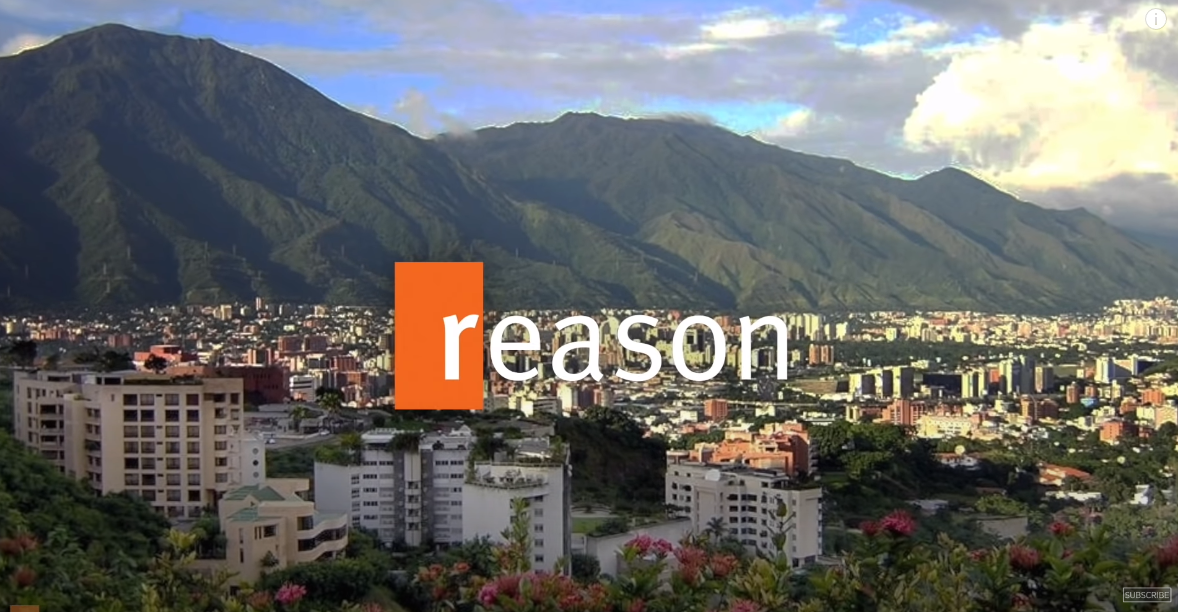Reason.TV: 3 Ways Bitcoin Is Promoting Freedom in Latin America
Starting a new business in Brazil takes about 14 times as long as it does in the United States. And in the 2016 Index of Economic Freedom, the country ranked a dismal 122nd. Brazilian entrepreneur Edilson Osório believes that bitcoin can help solve this problem

3. Cutting Red Tape
Starting a new business in Brazil takes about 14 times as long as it does in the United States. And in the 2016 Index of Economic Freedom, the country ranked a dismal 122nd.
Brazilian entrepreneur Edilson Osório believes that bitcoin can help solve this problem—not the currency itself, but rather the database file where transactions are recorded in the bitcoin network. That database is known as the blockchain, and it's a computer file with a unique architecture that means that it can never be altered or tampered with. Writing information to the blockchain is like inscribing a message in wet cement.
This incorruptible file, enthusiasts believe, has the potential to fill the void left by Latin America's weak government institutions. For example, in Honduras, one company has explored moving land titles from ancient paper volumes to the bitcoin blockchain where citizens of the country can verify that they haven't been secretly altered. (The project later stalled.)
Osório has a similar vision for how the blockchain can provide the trust that's sometimes missing from Brazil's government institutions.
Specifically, his idea is to use the blockchain to disrupt Brazil's notorious notary industry, which is a major source of red tape. The government requires that Brazilians go through a notary office to verify the authenticity of documents like birth certificates, contracts, and car titles, with every business transaction.
Osório company, OriginalMy, offers a different method for verifying documents that eliminates the hassle. The website he built allows customers to upload encrypted representations of their important documents to the blockchain. Then at any point in the future it's possible to prove a document's authenticity by checking it against the original.
The hope is that this new system for establishing trust will improve the country's business climate.
Written and produced by Jim Epstein. Graphics by Joshua Swain. Additional production help from Ian Keyser.
https://reason.com/video/2016/11/29/bitcoin-blockchain-brazil-venezuela/
Video transcription
in Venezuela's capital city of Caracas ahungry mob recently broke into a zoo toeat a horseone cause of the food crisis isgovernment currency controls that makeit very expensive to buy goods fromother countries but Venezuelans arebypassing these restrictions using theinternet-based currency Bitcoin andthere are similar phenomenon inneighboring countries Bitcoin iscatching on especially fast in LatinAmerica because it gives individualsaway around protectionism and otherdestructive government policies here arethree ways that Bitcoin is promotingeconomic freedom in Latin AmericaBitcoin it's an alternative to usinggovernment money and I think that's agame changer Rodriguez Sousa is aus-based entrepreneur who operates surBitcoin which is an online marketplacewhere Venezuelans buy and sellgovernment-issued bolivars for bitcoinssir bitcoins monthly trade volume hastripled in the last year alone as moreand more than his Whelan's have startedusing Bitcoin an advantage of Bitcoin isthat while the government regulates andrestricts the flow of money in and outof the country through the bankingsystem bitcoins circumvent the banksbecause it's an internet based currencyit is not only government nobodycontrols before and now a growingcommunity of Venezuelans are using theirbitcoins to buy food from e-commercesites like Amazon in walmart.com thepackages are routed to one of a handfulof miami-based Poirier services and thenshipped to Venezuela where they'redelivered to the homes of people trappedin this starving nation when the iPhonesix went on sale in Brazil two years agothe price was so absurdly high that itbecame fodder for one of the country'smost popular late-night talk shows yeahprimera cosa people said watch fuzzykokujin ly phony says move now see whereragazzo i policy league are from Aminalevar Amina pramana me camara Mina Mirmeet Rosetta - it says the explanationfor this high price is that the countrycharges an import tariff on foreigngoods the runs as high as 60% their ideaof the Brazil government is like ok sowe're gonna put the high tax on apple soapple can come to Brazil so we cangenerate jobs in Brazil pretty much itit kills Brazil but the money iscollected to the traditional financialsystem today a growing number ofBrazilians are avoiding the import taxby purchasing products like iPhones withBitcoin this way the government simplyhas no way of knowing how muchBrazilians are spending buying goodsfrom abroad Bitcoin is also an effectivetool for avoiding taxes when movinginvestment capital into Brazil weactually work with some venture capitalfunds some private individuals there areinvestors in Brazil and once you bringmoney to Brazil Thiago Caesar is thefounder and CEO bit one the companyhelps clients get around to 27 and ahalf percent foreign exchange tax whenbringing money into the country by usingBitcoin but circumventing protectionisttariffs isn't just for investors averageBrazilians traveling abroad will findthat they're automatically hit with asix point three eight percent levy everytime they swipe a debit or credit cardmany have realized if they use a Bitcoincredit card from Zappo or a BV cash theycan escape the tax altogether it's notillegal because there are no regulationscovering that subject in Brazil nowthere is a gap and when there is a gapnot saying that it is illegal then it'snot illegal right[Music]starting a new business in Brazil takesabout 14 times as long as it does in theUnited States and in the 2016 index ofeconomic freedom the country ranked atdismal 120 second Brazilian entrepreneurEdelson Nazario believes that bitcoincan help solve this problem not thecurrency itself but rather the databasefile where transactions are recorded inthe Bitcoin network that database isknown as the blockchain and it's acomputer file with a unique architecturethat means it can never be altered ortampered with writing information to theblockchain is like inscribing a messagein wet cementthis incorruptible file enthusiastsbelieve has the potential to fill thevoid left by latin america's weakgovernment institutions for example inHonduras one company's explored movingland titles from ancient paper volumesto the Bitcoin blockchain where citizensof the country can verify that theyhaven't been secretly altered asari auhas a similar vision for how theblockchain can provide the trust thatsometimes missing from brazil'sgovernment institutions system over noque no la famosa pela sua da da da needa keyyosh key went on potential jews of theblockchain o Brasil mi or aleppo Jitsudemise a popular song specifically hisidea is to use the blockchain to disruptBrazil's notorious notary industry whichis a major source of red tape thegovernment requires that Brazilians gothrough a notary office to verify theauthenticity of documents like birthcertificates contracts and car titleswith every business transaction a sarioscompany offers a different method forverifying documents that eliminates thehassle called original my the website hebuilt allows customers to uploadencrypted representations of theirimportant documents to the blockchainthen at any point in the future it'spossible to prove a documentsauthenticity by checking it against theoriginal and the hope is that this newsystem for establishing trust willimprove the country's business climateyou blockchain you thinkpoder de trans episode ademástransparencia reserve poder de voltaprompt Rasmus de población Ivanova todose scenario G política Publica Antigua

